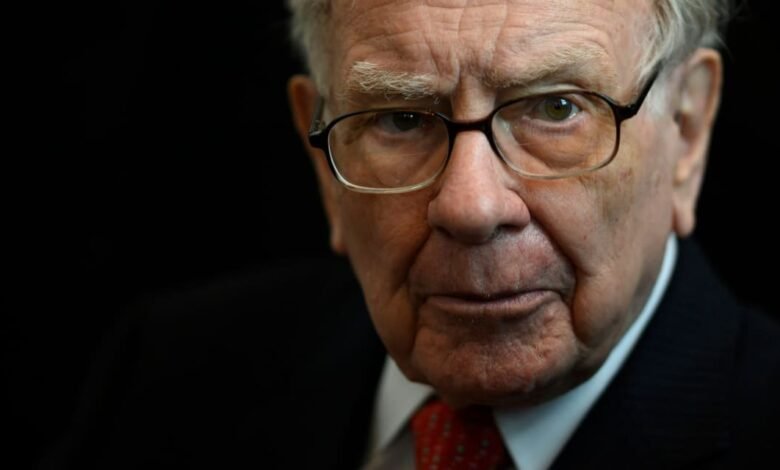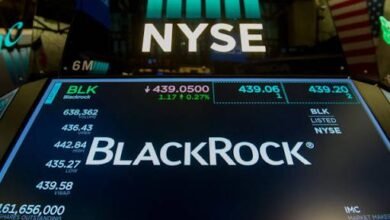Buffett praises âarchitectâ Munger, but doesnât reveal new investment for 2024

Berkshire Hathaway Chairman Warren Buffett began his annual missive to investors on Saturday with a touching tribute to his longtime business partner, Charlie Munger, whom he credited as the conglomerateâs âarchitect.â
Buffett also lamented the difficulty of picking new investments for a company of Berkshireâs size and said he has no intention of buying the rest of Occidental Petroleum in which it held a nearly 28% stake at the end of 2023. He also offered an update on the success of Berkshireâs insurance business as well as its investments in Coca-Cola, American Express and five Japanese trading houses and detailed troubles in its energy and freight rail businesses.
Farewell to Munger, the âarchitectâ of Berkshire
Buffett has always been Berkshireâs front man but according to the 93-year-old investor, it was Munger who was truly the âarchitectâ of the conglomerate.
In fact, it was Munger who originally came up with Berkshireâs longstanding mission statement to buy âwonderful businesses at fair pricesâ after criticizing Buffett for purchasing Berkshire Hathaway, then a struggling New England textile business.
âIn reality, Charlie was the âarchitectâ of the present Berkshire, and I acted as the âgeneral contractorâ to carry out the day-by-day construction of his vision,â Buffett said.
Munger passed away on Nov. 28 just 33 days shy of his 100th birthday.
Berkshireâs latest buy remains a mystery
An unusual element of suspense accompanied the release of this yearâs Berkshire annual report. Investors were waiting to see if Buffett would disclose the conglomerateâs latest purchase, widely believed to be a financial stock.
Unfortunately, they will have to keep on waiting.
No mention of the mystery company was made in the letter to shareholders, or in Berkshireâs annual report. Whatever the company is, itâs widely believed to be a financial firm, given the increased cost basis for financial companies which was first disclosed last year.
Buffett slams marketâs increasingly âcasino-likeâ behavior
Financial news and information can be transmitted around the world faster than ever before. Yet, humans appear just as prone to irrational behavior as they have always been, if not more so, Buffett noted.
He observed that while the modern U.S. stock market is larger than it was during Berkshireâs early years, the investors of today are âneither more emotionally stable nor better taughtâ than when he was young.
âFor whatever reasons, markets now exhibit far more casino-like behavior than they did when I was young. The casino now resides in many homes and daily tempts the occupants,â Buffett said.
Investors would do well to remember that somebody, somewhere will always find opportunity in hyping up the latest fads. Often, itâs Wall Street that benefits, while buyers are left poorer and worse off.
âNo interestâ in buying Occidental Petroleum
One of Berkshireâs biggest purchases over the past two years has been its 27.8% stake in Occidental Petroleum.
While Berkshire has the option of increasing its stake via warrants it owns, Buffett said he has âno interest in purchasing or managingâ Occidental â although the company particularly appreciates the firmâs vast holdings of oil and gas assets in the U.S., as well as its leadership in carbon-capture technology.
He praised Occidental CEO Vicki Hollub, saying Occidental is doing the right thing for both its country and its owners.
Buffett addresses âearnings disappointmentsâ at BNSF and Berkshire Energy
During last yearâs annual meeting, Buffett told investors that stronger earnings at BNSF, the U.S. freight railroad network owned by Berkshire, and Berkshire Energy Holdings, would help to cushion a decline in earnings at other Berkshire businesses
Instead, both turned in lackluster returns, and Buffett felt obligated to try and explain this to shareholders. Buffett attributed weakness at BNSF to rising wages after the White House had stepped in to avert a strike of American freight rail workers back in late 2022.
âLast year BNSFâs earnings declined more than I expected, as revenues fell. Though fuel costs also fell, wage increases, promulgated in Washington, were far beyond the countryâs inflation goals. This differential may recur in future negotiations,â he said.
The steeper decline in Berkshireâs energy business, meanwhile, was due to increased regulatory scrutiny of utilities in Western states like California and Hawaii following wildfires. He finished on an ominous note, hinting at the possibility that the energy business could suffer major setbacks depending on how regulators elect to respond.
âIt will be many years until we know the final tally from BHEâs forest-fire losses and can intelligently make decisions about the desirability of future investments in vulnerable western states. It remains to be seen whether the regulatory environment will change elsewhere,â Buffett said.
Berkshireâs size is biggest obstacle to new deals
Once upon a time, Berkshire had an abundance of potential takeover targets, but those days are long over.
Now, Berkshireâs sheer size makes finding potential acquisition targets extremely difficult, Buffett said. Its net worth according to generally accepted account principles stood at nearly $561 billion at the end of 2022, roughly 6% of the entire S&P 500 index.
âThere remain only a handful of companies in this country capable of truly moving the needle at Berkshire, and they have been endlessly picked over by us and by others. Some we can value; some we canât. And, if we can, they have to be attractively priced,â Buffett said.
As a result, Berkshireâs ability to substantially outperform the broader market has diminished. While Berkshire should perform better than the average well-run U.S. corporation, anything beyond âslightly betterâ would be âwishful thinking.â
Net income is âworse than uselessâ
The past three years offer an excellent example of why Buffett prefers operating income to âworse than uselessâ net income, which public companies are mandated to report.
Fluctuations in the stock market caused Berkshire to report a net loss of $23 billion in 2022 reflecting the unrealized decline in value of its stock portfolio. On either side of that $23 billion loss were two annual gains of more than $90 billion.
By comparison, operating income offers a more stable picture: it shows Berkshire earned $27.6 billion in 2021; $30.9 billion in 2022 and $37.4 billion in 2023.
Ajit Jain and Greg Abel will join Buffett on stage
Following the passing of Charlie Munger, Ajit Jain, who leads Berkshireâs insurance businesses, and Greg Abel, who leads Berkshireâs non-insurance businesses, will join him on stage in Omaha for Berkshire Hathawayâs annual gathering on May 4.
Berkshire Hathawayâs operating earnings after taxes rose 28% to $8.5 billion in the fourth quarter of 2023, driven by strength in the companyâs insurance business and its stronger investment returns this year.
Source link





